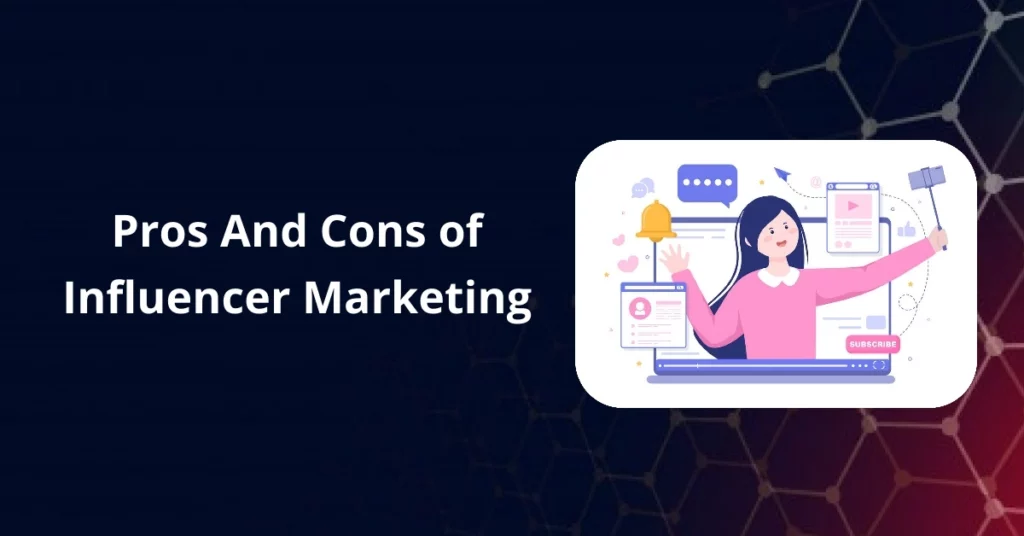Influencer marketing has become an increasingly popular way for small businesses and brands to reach their target audiences and boost brand awareness in 2025.
However, like any marketing strategy, it has its pros and cons.
In this blog post, I’ll discuss the pros and cons of influencer marketing for businesses, as well as provide tips on how to measure its success and implement an influencer marketing strategy effectively for your business in 2025.
So let’s dive in

Pros And Cons of Influencer Marketing
Pros
- Increased brand awareness: Influencer marketing allows businesses to reach a wider audience by leveraging the followers of popular influencers.
- Targeted audience: Influencers usually have a dedicated following that aligns with your target audience, which allows for more effective and efficient marketing.
- Authenticity: Influencers are known for being authentic and relatable, which can help build trust and credibility for your brand.
- Cost-effective: Influencer marketing is often more cost-effective than traditional forms of advertising, as it allows you to reach a large audience without the need for expensive ad placements.
- Increased engagement: Influencer marketing often leads to increased engagement, as the influencer’s followers are more likely to interact with and share the content.
- SEO benefits: Influencer marketing can also help boost your social media SEO by driving more traffic to your social handles, website and increasing your social media presence.
- Flexibility: Influencer marketing can be used for a wide range of marketing campaigns, from product launches to brand awareness.
- Measurable results: With the right tools and metrics in place, you can easily measure the ROI of your influencer marketing campaigns.
- Impact on purchase decision: Influencer marketing can have a direct impact on the purchase decisions of their followers, increasing the chances of conversion.
- Expansion of customer base: Influencer marketing allows you to reach a new set of audience which may not have known about your brand before.
- Influencer’s expertise: Influencers are experts in their respective niches, which can help you to promote your brand in a more effective way.
- Influencer’s creativity: Influencers are known for their creativity and can come up with unique and engaging ways to promote your brand.
Cons
- Risk of a bad fit: If the influencer’s values or image does not align with your brand, it can damage your reputation.
- Lack of control: You may not have full control over the content the influencer creates, which can lead to unexpected or negative results.
- High cost: Influencer marketing can be expensive, particularly if you are working with popular or high-profile influencers.
- No guarantee of success: There’s no guarantee that an influencer marketing campaign will be successful, even if it is executed perfectly.
- Limited reach: The reach of influencer marketing is limited to the followers of the influencer, which may not be as wide as traditional advertising methods.
- The impact may be short-lived: The impact of influencer marketing may be short-lived, as the audience may quickly lose interest in the content after the campaign is over.
- Could be considered as intrusive: Some audience may not like the fact that their favorite influencer is promoting something, leading to negative feedback.
- Dependence on influencer’s reputation: The success of your campaign is highly dependent on the reputation and credibility of the influencer you choose.
- Limited creativity: Influencers may not be as creative as you expect, which can limit the potential of your campaign.
- Lack of exclusivity: Other brands may also be using the same influencer, which can dilute the impact of your campaign.
- Limited scalability: Influencer marketing may not be as scalable as regular forms of advertising, as it requires a large number of influencers to reach a wide audience.
How to Measure the Success of Influencer Marketing

Measuring the success of an influencer marketing campaign can be challenging but it’s important to track key metrics in order to determine the ROI of your investment.
Some key metrics to track includes engagement, website traffic and conversions.
Engagement metrics such as likes, comments and shares can give you an idea of how well your content is resonating with the influencer’s audience.
Website traffic can also be tracked to see if there is an increase in visitors as a result of your campaign.
And conversions, such as sales or sign-ups, can give you a clear picture of the financial impact of your influencer marketing efforts.
Another important tool to use when measuring the success of influencer marketing is Google Analytics.
This platform can provide detailed insights into website traffic, including where visitors are coming from and how they interact with your site.
You can also set up goals and track conversions, such as how many visitors made a purchase or signed up for a newsletter.
By using Google Analytics, you can get a deeper understanding of the impact of your influencer marketing campaigns.
In order to accurately measure the success of your influencer marketing campaigns, it’s important to set clear goals and objectives from the start.
This will help you determine what metrics to track and how to measure the ROI of your investment.
For example, if your goal is to increase website traffic, you’ll want to track website visitors with UTM parameters and bounce rates.
If your goal is to boost sales, you’ll want to track conversion rates and revenue.
By setting clear goals, you’ll be able to more accurately measure the success of your influencer marketing efforts.
Another way to measure the success of influencer marketing is by conducting surveys and focus groups with the influencer’s audience.
This can provide valuable insights into how the audience perceives your brand and the impact of the influencer marketing campaign on their purchasing decisions.
Additionally, you can also track the performance of specific influencer-created content, such as the reach, engagement and conversion rate of a specific post or video.
How to Implement an Influencer Marketing Strategy

Implementing an influencer marketing strategy can seem overwhelming, but it doesn’t have to be.
By following a few simple steps, you can create a campaign that reaches your target audience and drives real results for your business.
First and foremost, it’s important to define your goals and objectives for the campaign.
Are you looking to increase brand awareness, drive website traffic or boost sales?
Once you have a clear understanding of what you want to achieve, you can begin to identify the influencers who will be the best fit for your brand.
Next, research potential influencers and identify those who align with your brand values and have a following that matches your target audience.
Look for influencers who have a strong engagement rate, as well as a track record of producing high-quality content that resonates with their audience.
Once you’ve identified a list of potential influencers, reach out to them with a clear and compelling proposal.
Be transparent about your goals, the compensation you’re offering, and the type of content you’re looking for.
After the Influencer accepts your proposal, it’s important to have a clear set of guidelines in place for the influencer to follow.
This should include details such as the specific message or call to action you want the influencer to include in their content, as well as any brand assets or logos they should use.
It’s also important to have a clear understanding of how you will measure the success of the campaign.
This should include key metrics such as engagement, website traffic, and conversions.
By setting clear goals and objectives, you’ll be able to more accurately measure the ROI of your influencer marketing efforts.
Finally, it’s essential to maintain open communication with the influencer throughout the campaign.
This includes providing feedback on their content, addressing any issues that may arise, and celebrating the successes of the campaign together.
Conclusion
Overall, influencer marketing has the potential to be a valuable addition to your marketing mix.
However, it’s important to be aware of its potential drawbacks and to measure its success in order to get the most out of your investment.
With the right approach, influencer marketing can help boost your brand awareness and drive conversions.
Do let me know your thoughts in the comments about influencer marketing for businsesses.
